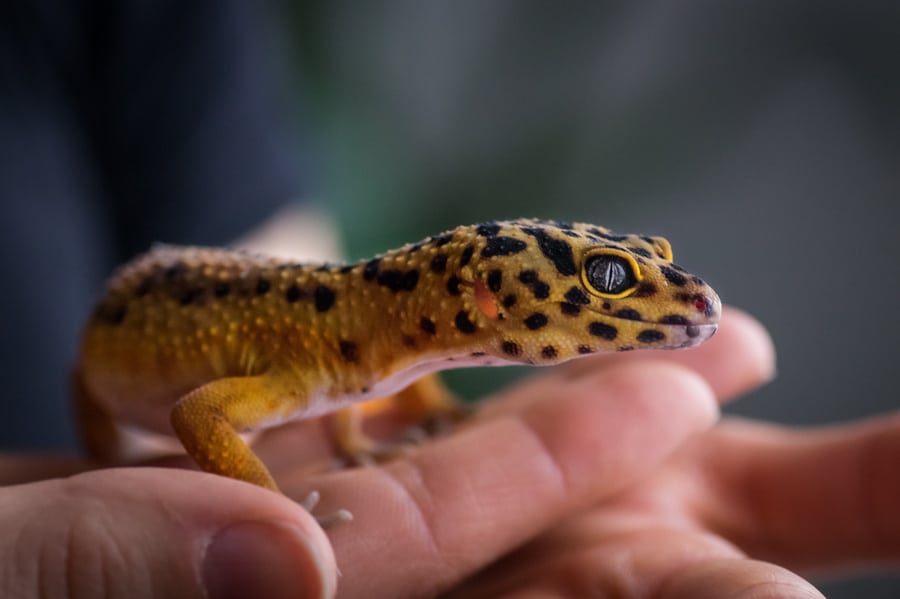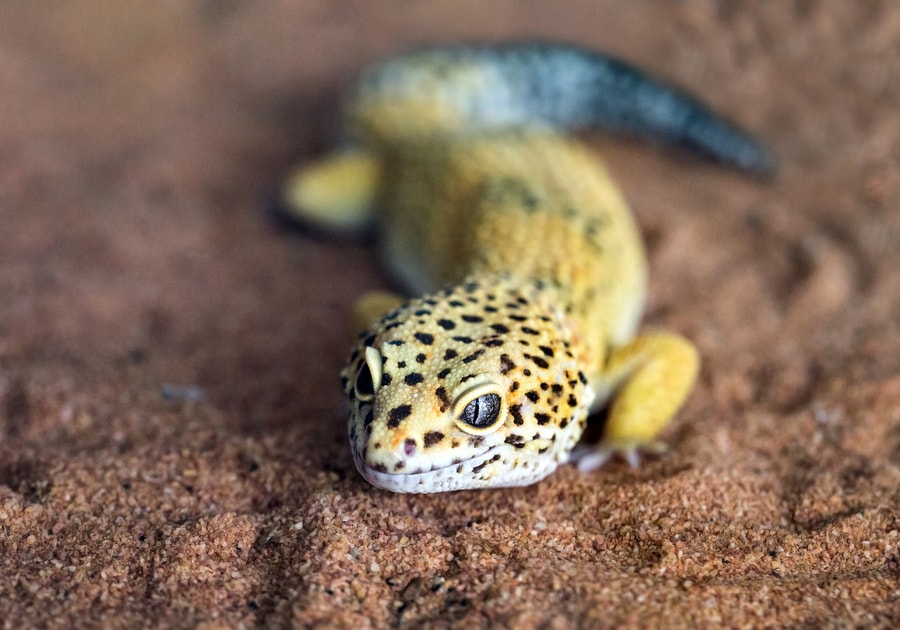
Whether you spend time with your leopard gecko and notice how it perks up at your presence, or you are considering buying one after you see a group of them smile at you in a pet store, you may be wondering about a typical leopard gecko’s personality. Can leopard geckos become friendly or affectionate as they spend time with their owners? Can a leopard gecko establish a bond with its owner?
Although leopard geckos are docile and friendly, they are not able to display strong affection or develop a strong bond with their owner. The reason why leopard geckos are friendly but not affectionate is that they have a physical bond rather than an emotional attachment to their owners.
To start off, we need to break down a typical leopard gecko’s personality. First, however, we also need to define the difference between being friendly and being affectionate. While friendliness involves reacting to people and stimuli in a non-hostile, approachable manner, affection involves expressing kindness to those people out of an emotional bond. With this clarification out of the way, we can now discuss which of these characteristics describe your scaly friend.
Leopard Geckos & Personality
Are leopard geckos friendly?
Yes, this is one of the major reasons why leopard geckos are such popular housepets! They are approachable and mild-mannered, which keeps them from being aggressive. Also, they do well with children (so long as they are supervised) and can make a wonderful first reptile pet. Because of its friendly temperament, a typical leopard gecko tolerates being handled as long as it does not feel threatened.
Although they may enjoy being with you, leopard geckos are not typically affectionate. They do not enjoy being handled just for the sake of feeling close to their owners (although they may like it because your hands are warm). Also, they will not crave your attention or try to please you like a dog or a cat would.
Baby Leopard Gecko Friendliness
Because leopard geckos are known for their kind, level-headed temperament, you may be wondering whether baby leopard geckos are the same way.
The answer is that baby leopard geckos have higher energy and aggression levels, so they do not have the same level of friendliness as their adult counterparts. They may act hostile and lash out if they feel that their territory is being threatened. Some baby leopard geckos will even scream if they are approached because they feel that they are in danger. Because of their on-edge temperament, they are more likely to bite their owners or drop their tails if provoked.
(As a note, although the leopard geckos in pet stores are young, they are not as young as a newborn baby leopard gecko—they are about half a year old. Because of this, their temperament more closely aligns with that of the adult leopard geckos, so you can adopt one of these pets without worrying as much about a hostile temperament.)
How Leopard Geckos Show Friendliness
Leopard geckos are expressive creatures, so they show their friendliness pretty clearly. When they are feeling friendly, leopard geckos seem curious about and interested in the person interacting with them. They will watch the person with interest and possibly go out of their hiding spot or basking area to see what the person is doing. If they are outside of the cage, they will climb all over the person as the naturally explorative, curious creatures they are. They are willing to be held occasionally (when handled gently) and appear relaxed.
Even if your leopard gecko is not in the mood to crawl on you or be handled, it may still be completely happy. A content leopard gecko has open ears, appears relaxed, and is curious about its environment. Common habits of a happy leopard gecko include basking and exploring while flicking its tongue.
It may not be running around at the moment, but it will appear engaged with its surroundings if it is not sleeping (however, it should not appear nervous). As it would with crawling on its owner or staying warm in its hands, it will be in a state of curiosity as it is exploring or relaxation as it is basking in the light or cooling in its shelter. Because of this, your leopard gecko is not avoiding handling because it is upset—it simply wants to explore something it is curious about or relax under the warm basking light.
Your leopard gecko should not be waving its tail around, as this indicates irritation, stress, or a sense of threat to its territory.
Because of the leopard gecko’s unique personality, it has unique preferences and needs in developing a relationship with its owner. You can use these applications to deepen your relationship with your leopard gecko and establish trust and friendliness.
Do Leopard Geckos Like to Be Handled?
Although leopard geckos do not like to be handled (unless, as previously mentioned, your hands are warm), they will usually tolerate it. A leopard gecko’s tolerance of handling depends on its temperament and whether it views handling as confinement or a way to explore. Regardless of the leopard gecko’s temperament, however, it will not be seeking out your hand to cuddle (unlike a dog or cat licking your hand or sitting in your lap). Sometimes, if you handle them without moving around too much, you can actually help them feel warm and safe (but only if you have already established a trust relationship with them).
Speaking of moving around too much, you should not cuddle your gecko. Excessive touching and movement will stress your gecko out. If it becomes extremely stressed, your leopard gecko may even drop its tail.
To avoid such a scenario as your pet losing its tail (which contains important fat storage), you should watch its body language closely when you are handling it or it is out of the terrarium. If your gecko is squirming, waving its tail, and squeaking or clucking, you should gently loosen your grip and, if it still seems startled, return it to the terrarium. Also, you should avoid grabbing it around the tail area or making other sudden movements.

Leopard Geckos & Ownership Bonding
Do leopard geckos bond with their owners?
Once a leopard gecko spends time with its owner and begins to recognize their scent, it begins to trust the owner and possibly bond in a physical way. It can start feeling protected by its owner and even enjoy spending time with them.
However, the leopard gecko’s main instinct is for survival, so although it may trust and even enjoy being with its owner, it likely does not feel a close attachment as much as it has associated its owner with provision and security.
Even though your leopard gecko may not have a bond in terms of an emotional attachment, it does have many characteristics of a close bond, including recognizing its name. For example, you can train your leopard gecko to respond to its name by mentioning it before a positive experience, such as feeding time. It may only associate its name with that positive experience rather than as a label assigned to it, but this can still result in an enjoyable experience for both parties.
Do Leopard Geckos Bond with Each Other?
Overall, leopard geckos may tolerate or even like one another to a point, but they do not form close bonds with one another. They are naturally solitary creatures and will avoid one another unless their relationship supports them in some way.
However, a leopard gecko’s main instinct when meeting another one of its kind is to avoid domination and hopefully dominate itself. They prioritize survival of the fittest. Especially larger leopard geckos will dominate food, shelter, and heat.
Because of this, you should ideally not have them in the same terrarium—they will not bond with one another and will only cause one another more stress. If, however, you need to have two leopard geckos together, you should only do this with females to avoid violent fighting or excessive mating.
Building Trust with Leopard Geckos
Although your leopard gecko may not develop a life devotion or attachment as a German shepherd would, you can still form a trusting, positive relationship.
To do this, spend time with your leopard gecko at least once a day while it is in its terrarium. You shouldn’t bring it out of its cage (except for cleaning the terrarium) at first, but you can still sit next to its cage while it is eating or exploring. During this time, talk to your leopard gecko soothingly, so it can recognize your voice and realize that you are here to support it. You should avoid sudden movements, loud noises, or touching your leopard gecko excessively. All of these issues can cause stress to your pet and may worsen your relationship with it.
As you gain your leopard gecko’s trust, you will be able to handle the leopard gecko and allow it to explore outside of the terrarium. At this point, you will develop a friendly relationship with your leopard gecko and truly understand the perks of owning this mild-mannered, fun pet. To do this properly, you should always bring your leopard gecko to a calm, stress-free environment. This environment should be away from loud noises or other pets.
To maintain this level of trust, you should perform activities such as feeding and changing lights at regular times. Also, you should continue speaking to your leopard gecko with a soft voice when you are in the room, so it feels safe. Finally, leopard geckos tend to recognize their owners by scent. Because of this, you should avoid wearing scent or perfume while handling your gecko. Otherwise, it will feel stressed and may even attack you.
Concluding Thoughts
Current Owners of Leopard Geckos
After noticing how your gecko runs out at feeding time and seems to enjoy your presence, you may feel disappointed upon hearing that it does not have an emotional bond to you as much as it has a strong physical trust.
However, this in itself is something you should be happy about. Although leopard geckos are docile creatures, it takes time to convince them to fully trust you. They are typically shy about human contact and may even lash out at someone they do not know or trust. The fact that they feel comfortable with being held and look forward to you coming to feed them indicates good ownership.
If, however, you feel concerned that your leopard gecko is not expressing trust towards you after reading this article, you can still build or repair a strong relationship. Work to establish yourself as a gentle, reliable caregiver, and ensure that your scaled friend is in a quiet habitat away from other stressors, such as noisy children or other pets.
Those Looking to Buy a Leopard Gecko
If you are considering adopting a scaled friend after reading this article, you are in for an exciting, rewarding relationship. While leopard geckos have a sweet, friendly nature, they are also naturally energetic and love to explore, making them a perfect first pet. As mentioned earlier, they are not necessarily the type to be handled by a large group of noisy children, but they do offer a rewarding relationship for those willing to invest a few moments to say hi.
If you are looking to purchase a leopard gecko for your child, but you want to keep a relationship of trust and security between them, you can certainly do this. When starting off, supervise the leopard gecko and child at all times to avoid loud noises or overhandling. Even when your child knows how to handle a leopard gecko properly, you should check in to ensure that your child is maintaining decent upkeep in warming the terrarium, feeding, and cleaning. Not only does this establish the much-needed relationship of trust, but it also keeps your child from unintentionally overlooking important issues that can create large health impacts later on. The average leopard gecko lives 15 years, so if your child is 10 when they adopt a leopard gecko, they could very well be keeping it into college if they take care of it properly.
With this new knowledge under your belt, you are free to understand the personality and temperament of your leopard gecko—or get a scaly friend of your own!
For a complete breakdown of how reptiles bond with their owners, please check out this helpful guide.
